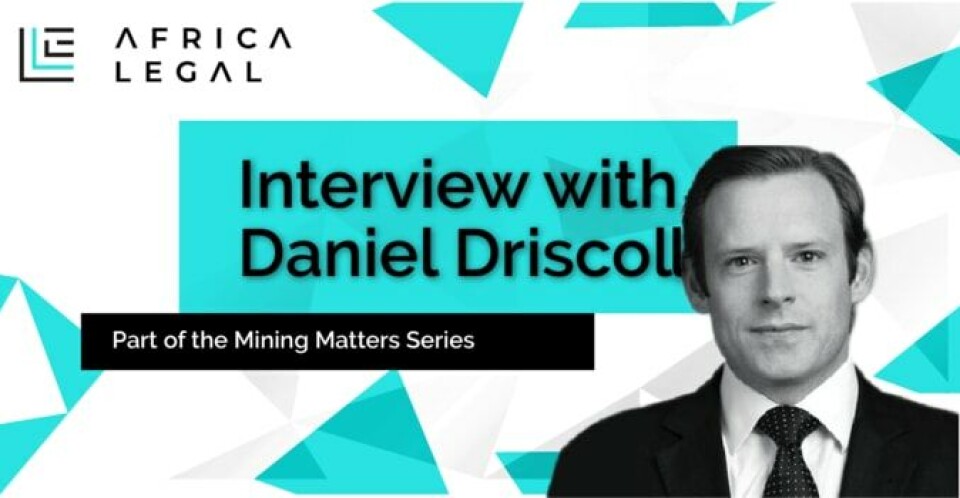Copyright : Re-publication of this article is authorised only in the following circumstances; the writer and Africa Legal are both recognised as the author and the website address www.africa-legal.com and original article link are back linked. Re-publication without both must be preauthorised by contacting editor@africa-legal.com
Corporate Citizenship Brings Success

The vice-president of Endeavour Mining’s legal division, Daniel Driscoll, is to co-chair the GC Forum at the African Mining Indaba in Cape Town on February 6.
Driscoll came to mining unintentionally.
While in private practice in 2007 he was asked to advise several junior coal producers operating in the Appalachian region of the United States. Until that moment his career had been on a predictable corporate law path, but the experience gave him a “taste for natural resources” and set his career (and his life) on an unexpected course.
“I moved into the oil and gas sector for a number of years and worked in the Middle East, the North Sea and then Africa.”
Today his responsibilities cover exploration, projects and producing assets across five Francophone countries in West Africa – a region where there is a high degree of regulatory coordination.
“Most of the Francophone countries in West Africa share a common currency, central bank and legal regime, which certainly makes it easier to work across its various jurisdictions.”
“But, regardless of where you are doing business in Africa, the key to success is good corporate citizenship.”
Of course host nations must be good regulators if they want to attract and retain foreign investment, he says, but extractive companies have obligations too. These include respecting the environment and human rights, combating corruption, meeting fiscal obligations and building the capacity of the local workforce by transferring skills and knowledge.
It is the insight gleaned from working in this context that has prompted Driscoll to become involved in the GC Forum’s ‘A Legal Indaba’.
“In private practice you are surrounded by lawyers with whom you can test ideas and share experience, but when you go in-house you gradually lose that network.”
“A Legal Indaba will be a valuable resource for understanding and resolving legal, compliance and regulatory issues.”
This is particularly important for Africa, which has 54 sovereign jurisdictions following a variety (and in some cases a combination) of Roman, Islamic and common law traditions.
The key themes of the meeting are: Risk, Growth and Sustainability - areas where there is a substantial degree of overlap.
“It makes sense to develop and implement environmental, social and governance (ESG) initiatives in a coordinated way. Otherwise, you end up with excessive, inefficient and sometimes inconsistent, internal procedures.”
Endeavour Mining is developing its ESG initiatives by reference to the World Gold Council’s Responsible Gold Mining Principles (RGMP), he said.
“Our ESG initiatives are being coordinated by our Investor Relations department. We see two primary advantages to our approach. First, following the RGMP ensures that our approach is benchmarked against industry best practices. Second, putting Investor Relations at the centre of this process ensures that the important work we are doing in this area is effectively communicated to our shareholders and also that the interests and concerns of our shareholders are reflected in our approach.”
Also on the Indaba agenda will be conversations on how mining sector legal departments can add value in a modern and changing Africa.
“Legal tech, alternative legal services, and AI have radically changed the legal industry. The questions to be asked are no longer just should I outsource and, if so, which firm should it use. The modern GC needs to understand the strengths and weaknesses of the various technologies and alternative legal services available and know how to blend them with traditional legal resources to maximise the budget and both de-risk and empower the business.”
Legal, compliance and regulatory issues exist in every aspect of a mining business, he warned, but legal department budgets did not allow GCs to be everywhere they needed to be.
“It is possible, however, to amplify the impact of the legal budget and the in-house legal team by using them to provide the business with the tools and skills they need to operate in less risky ways and to spot and respond to risk as and when it arises.”
There will always be an element of firefighting, he said.
“If we could eliminate unforeseen legal and regulatory risk, then we would not need lawyers - but the more you can systematically de-risk the business and get out in front of regulatory changes, then the less budget and management time is spent firefighting. There is definitely a snowball effect to this.”
Driscoll spends about 250 days a year on the road, so cherishes his time at home.
“We have just finished a two-year renovation of a 19th Century townhouse so, after years remediating wonky floors, drafty windows and carpeted bathrooms, it is nice to be at home. I have taken up gardening to relax.”
Sport has also played an important role in his life. He played NCAA lacrosse during university in the United States, but today he focuses on more relaxing athletic pursuits. “I run a lot to decompress and find headspace.” When time permits he also enjoys sailing and the equestrian world. “I grew up riding and have a great love of horses. One of the highlights of the three years I lived in Mozambique was that I got to ride every weekend.”
